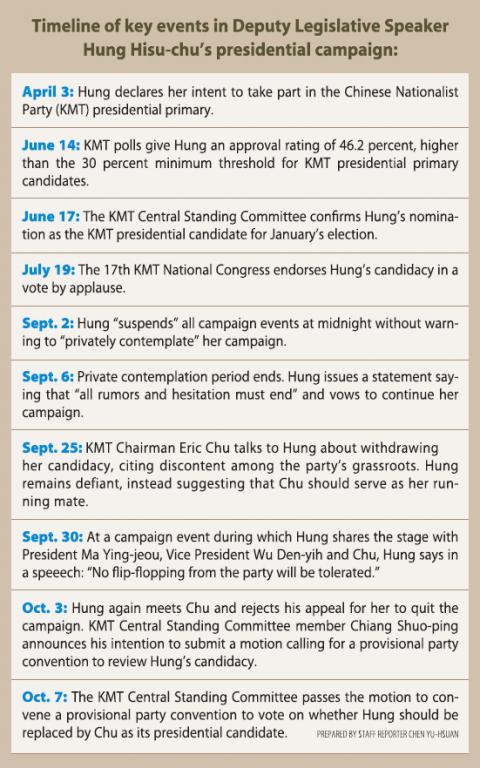There was a time when the Chinese Nationalist Party (KMT) and President Ma Ying-jeou’s (馬英九) administration could console themselves with at least one perceived advantage over the Democratic Progressive Party: their cross-strait policy.
That KMT presidential candidate Hung Hsiu-chu (洪秀柱) managed to squander even that advantage away explains why the KMT now appears it would stop at nothing to annul her candidacy.
The fundamental weakness of Hung’s campaign is her radical pro-unification ideology, which has prompted the top echelons of the Presidential Office, the KMT and “elders” with the pan-blue camp to unite in calls for her to withdraw from the presidential race.

If she were allowed to continue, Hung’s cross-strait platform — a mess for which Hung has only herself to blame — would doom not only her campaign, but also those of KMT legislative candidates.
A KMT rout from the legislature would be the kind of nightmare scenario in which the party’s continued existence would not be guaranteed. Yet Hung apparently remains oblivious to the disaster she has created.
Therefore, KMT leaders have in recent days demonstrated considerable resolve in neutralizing Hung, running roughshod over procedural niceties, as well as public opinion.
The KMT Central Standing Committee on Wednedsay unanimously passed a resolution to call an extraordinary party congress to deliberate a proposal to replace her.
Although the KMT headquarters’ drastic methods prompted criticism, Hung’s stubborn and unthinking refusal to confront the matter has left the KMT no choice — “whatever the costs, Hung must go.”
KMT Chairman Eric Chu (朱立倫) voiced the discontent of grassroots members when he panned her cross-strait policy as out of touch with mainstream public opinion.
However, Hung brushed Chu off and blithely attributed the public furor over her China policy comments to “flawed communication.”
Ultimately, Hung’s self-righteous belief in her role as a champion of “truth,” and her indifference to the survival of KMT legislative candidates, are the reasons the KMT has “collectively disidentified” with Hung.
Hung’s cross-strait stance relies heavily on the ideas of Chang Ya-chung (張亞中), an academic with strong pro-unification views; crucially, Hung’s China policy discourse goes above and beyond Ma’s.
After Hung heedlessly crossed the Ma government’s “China-policy red line,” Ma had no choice but to sever his support for Hung.
A pan-blue camp politician once said that if, for the sake of argument, one concedes that the KMT is “pro-China,” then in comparison with the KMT, Chang and his ilk are “just red.” Left unchecked, the “red tide” from Hung’s campaign would crush the KMT as surely as it has crushed Hung.
Translated by staff writer Jonathan Chin

Alain Robert, known as the "French Spider-Man," praised Alex Honnold as exceptionally well-prepared after the US climber completed a free solo ascent of Taipei 101 yesterday. Robert said Honnold's ascent of the 508m-tall skyscraper in just more than one-and-a-half hours without using safety ropes or equipment was a remarkable achievement. "This is my life," he said in an interview conducted in French, adding that he liked the feeling of being "on the edge of danger." The 63-year-old Frenchman climbed Taipei 101 using ropes in December 2004, taking about four hours to reach the top. On a one-to-10 scale of difficulty, Robert said Taipei 101

Nipah virus infection is to be officially listed as a category 5 notifiable infectious disease in Taiwan in March, while clinical treatment guidelines are being formulated, the Centers for Disease Control (CDC) said yesterday. With Nipah infections being reported in other countries and considering its relatively high fatality rate, the centers on Jan. 16 announced that it would be listed as a notifiable infectious disease to bolster the nation’s systematic early warning system and increase public awareness, the CDC said. Bangladesh reported four fatal cases last year in separate districts, with three linked to raw date palm sap consumption, CDC Epidemic Intelligence

US climber Alex Honnold left Taiwan this morning a day after completing a free-solo ascent of Taipei 101, a feat that drew cheers from onlookers and gained widespread international attention. Honnold yesterday scaled the 101-story skyscraper without a rope or safety harness. The climb — the highest urban free-solo ascent ever attempted — took just more than 90 minutes and was streamed live on Netflix. It was covered by major international news outlets including CNN, the New York Times, the Guardian and the Wall Street Journal. As Honnold prepared to leave Taiwan today, he attracted a crowd when he and his wife, Sanni,

Taiwanese and US defense groups are collaborating to introduce deployable, semi-autonomous manufacturing systems for drones and components in a boost to the nation’s supply chain resilience. Taiwan’s G-Tech Optroelectronics Corp subsidiary GTOC and the US’ Aerkomm Inc on Friday announced an agreement with fellow US-based Firestorm Lab to adopt the latter’s xCell, a technology featuring 3D printers fitted in 6.1m container units. The systems enable aerial platforms and parts to be produced in high volumes from dispersed nodes capable of rapid redeployment, to minimize the risk of enemy strikes and to meet field requirements, they said. Firestorm chief technology officer Ian Muceus said